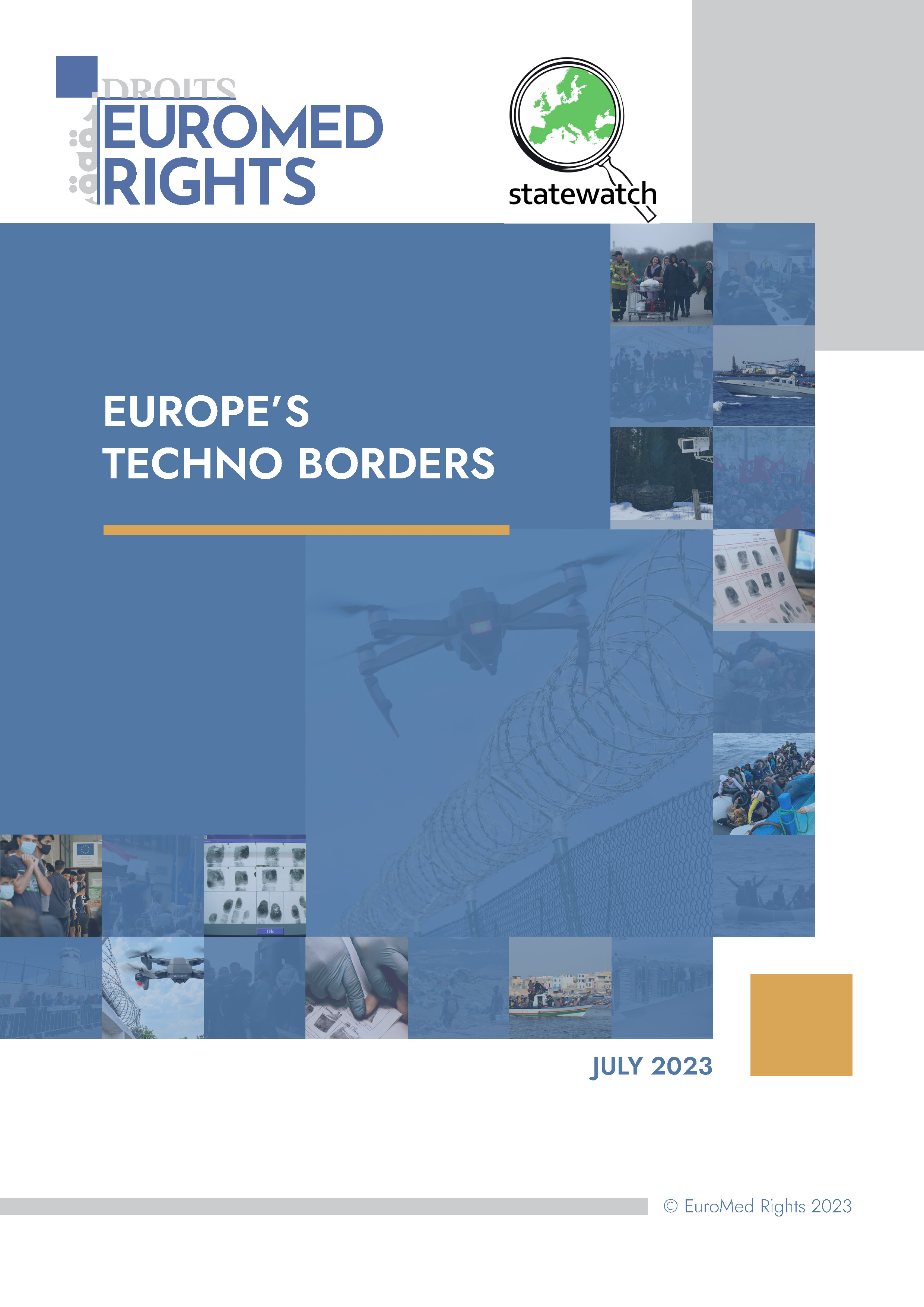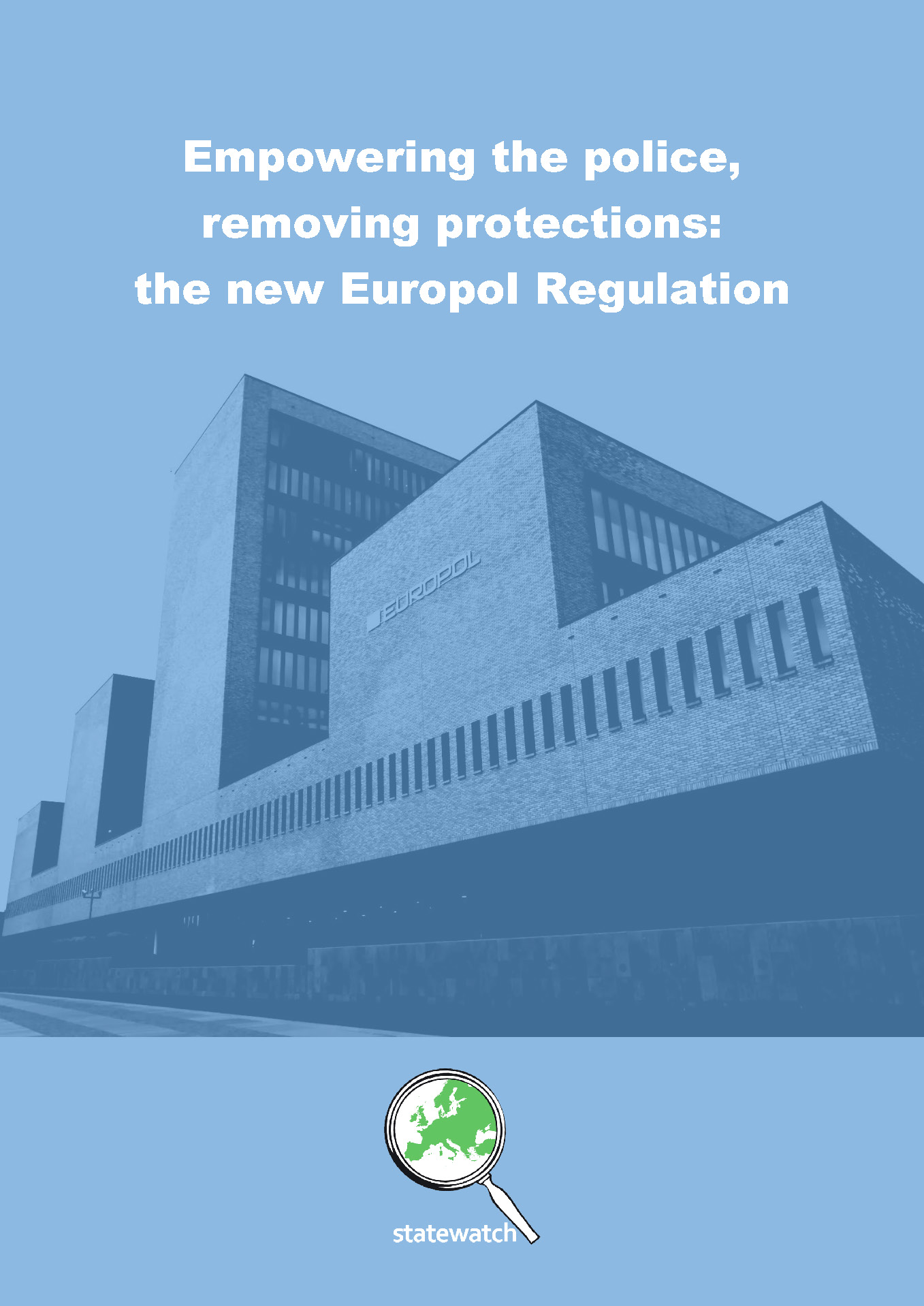EU: Digital and migrant rights groups call for "full rejection" of new anti-smuggling powers
Topic
Country/Region
20 February 2025
Two new laws against migrant smuggling should be rejected by EU legislators, says a position paper published today. The paper, by the #ProtectNotSurveil coalition, analyses two proposals: an update of a 20-year old law on criminal penalties for migrant smuggling; and new rules to give police agency Europol more powers. The approach adopted by the EU "will not provide the care and protection people need, but only aggravate the criminalisation and dehumanisation of people on the move," argues the paper. Statewatch is a member of #ProtectNotSurveil and supported the drafting of the paper.
Support our work: become a Friend of Statewatch from as little as £1/€1 per month.

The text that follows is the executive summary to the position paper: Stopping the unfettered expansion of Europol's digital surveillance powers against migrants (pdf)
In November 2023, the European Commission proposed a new legislative package 'to prevent and combat migrant smuggling'.
The package contains
(i) an update of the 20-year-old legislative framework (the 2002 facilitation package) under a single Directive;
(ii) a reform of the mandate of the EU law enforcement cooperation agency, Europol; and
(iii) an international 'alliance' to enrol third countries in tackling 'migrant smuggling' globally.
The #ProtectNotSurveil coalition understands the Facilitators Package as a further expansion of a digital surveillance regime that is based on the criminalisation and punishment of people on the move, as well as of those who provide humanitarian assistance to them.
We share the serious concerns already expressed by other civil society actors in the sector (such as PICUM, Equinox and BVMN) that the chosen approach will not provide the care and protection people need, but only aggravate the criminalisation and dehumanisation of people on the move.
This position paper focuses primarily on the Europol Regulation, which proposes a significant expansion of powers, especially when it comes to its digital surveillance capabilities.
We argue that the European Commission is working under an unproven and non-credible assumption that increased police powers and large-scale data processing will somehow protect migrants, refugees and asylum-seekers from ‘smugglers’.
The result is a law that will create more harm and discrimination for migrants and humanitarian actors at the hands of EU and national law enforcement and border authorities, whilst failing to counter the business model of organised smuggling networks.
The expansion of Europol’s powers can therefore be understood instead as a power-grab that is cynically and retroactively justified by feigned concern for people on the move.
We argue that:
- The legislative package, including the Europol Regulation, fails in its objective to target smuggling networks, reduce border deaths, or protect migrants;
- We reject the European Commission's premise that increased police powers and large-scale data processing will protect migrants, refugees and asylum-seekers. The result is not increased safety, but more dangerous routes and more persecution, discrimination and violence by authorities. Without providing adequate regular pathways to migration, smugglers will be able to continue their business model, while violent policing and unlawful data collection will be concentrated on the migrants the law is supposed to protect;
- The Europol Regulation fails to meet the EU’s Better Regulation and legality requirements;
- The European Commission has failed to conduct an impact assessment, and its analytical document does not substantiate the necessity and proportionality of the proposed measures and their interference with fundamental rights. Doubts about the necessity and proportionality of the proposal were not only raised by civil society, but by Member States themselves;
- The Europol Regulation unlawfully expands the EU's digital surveillance infrastructure without appropriate safeguards;
- This is particularly important in the context of biometrics, because the processing of biometric data constitutes a serious interference with the right to privacy and the protection of personal data and requires to be compliant with the principles of legality, necessity and proportionality;
- The expansion of powers, budget and resources to Europol through this Regulation circumvents the democratic process on budget allocation; and
- We fear that this proposal purporting to tackle criminal activities of migrant smuggling may in fact be a trojan horse for the actual purpose of providing Europol with increased budget, equipment and staff. It should rather be publicly debated as part of the upcoming discussions on the next EU Multi-Annual Financial Framework and weighted against other non-security, alternative approaches.
We demand the full rejection of this reform and call on the EU to take responsibility for its own role in forcing migrants into life-threatening situations with no choice but to resort to ‘smuggling' networks.
To effectively end smuggling, we need an urgent shift in logic, starting with changing the EU's hostile border and migration policies and punitive digital borders.
Read the full paper: Stopping the unfettered expansion of Europol's digital surveillance powers against migrants (pdf)
Our work is only possible with your support.
Become a Friend of Statewatch from as little as £1/€1 per month.
Further reading

Europe's techno-borders
The digital technologies deployed as part of Europe’s techno-borders underpin invasions of privacy, brutal violations of human rights, and make the border ‘mobile’, for example through the increased use of biometric identification technologies, such as handheld fingerprint scanners. This report analyses the past, present and future of Europe’s “techno-borders,” the infrastructure put in place over the last three decades to provide authorities with knowledge of – and thus control over – foreign nationals seeking to enter or staying in EU and Schengen territory.

Empowering the police, removing protections: the new Europol Regulation
This report examines the new powers granted to EU policing agency Europol by legal amendments approved in June 2022. It finds that while the agency's tasks and powers have been hugely-expanded, in particular with regard to acquiring and processing data, independent data protection oversight of the agency has been substantially reduced.

Putting the cart before the horse: the Commission’s proposal to increase Europol's powers
Hounded by criticism from civil society and EU member states over its new proposal to increase the powers of Europol, the European Commission has belatedly published an “analytical document” in lieu of a formal impact assessment. The new proposal would lead to the storage of vast quantities of information by Europol on human smuggling and trafficking cases, intended to increase investigations and prosecutions. However, the Commission’s document offers a minimal analysis of the potential impact on individual rights, particularly of people in vulnerable situations, and the data protection safeguards at Europol are inadequate for the proposed changes.
Spotted an error? If you've spotted a problem with this page, just click once to let us know.

